Dutch pensioner, 77, decides to die by euthanasia after failing to cope with horrifying injuries from being brutally beaten by robber while he was in bed
A Dutch pensioner has committed suicide through euthanasia after he was unable to cope with the trauma he suffered during a brutal home invasion at the end of last year, it has emerged.
Jan Beulenkamp, 77, suffered brain damage and a host of other serious injuries when he was attacked in bed at his home in Liendenhof, Amsterdam-Zuidoost, in November.
Shocking footage from after the attack showed the elderly Dutch man with horrific bruises and cuts to his face, neck and chest as he lay in a hospital bed.
The devoted grandfather tried to recover, with the support of his wife, children and a number of doctors and therapists, but his quality of life deteriorated as he struggled with speech problems, partial paralysis and mental trauma.
Three months after the horrific attack, Mr Beulenkamp chose to commit euthanasia. He had received permission to do so from the Dutch authorities.
His assailant is still at large, which is why the Public Prosecution Service has offered a reward of €10,000 for any information leading to his arrest.
Jan Beulenkamp, 77, suffered brain damage and a host of other horrific injuries when he was violently attacked (pictured with grandchildren)
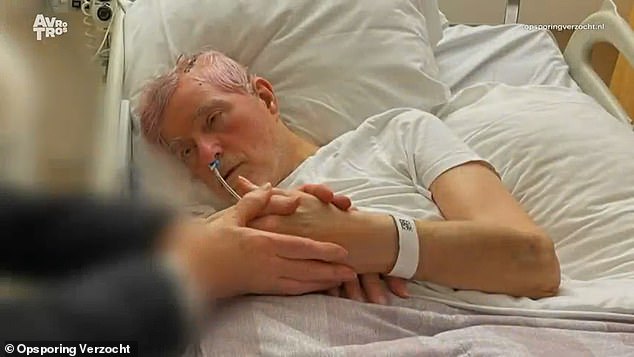
The retiree, supported by his wife, children and a number of doctors and therapists, tried to recover, but his quality of life deteriorated as he struggled with speech problems, partial paralysis and mental trauma
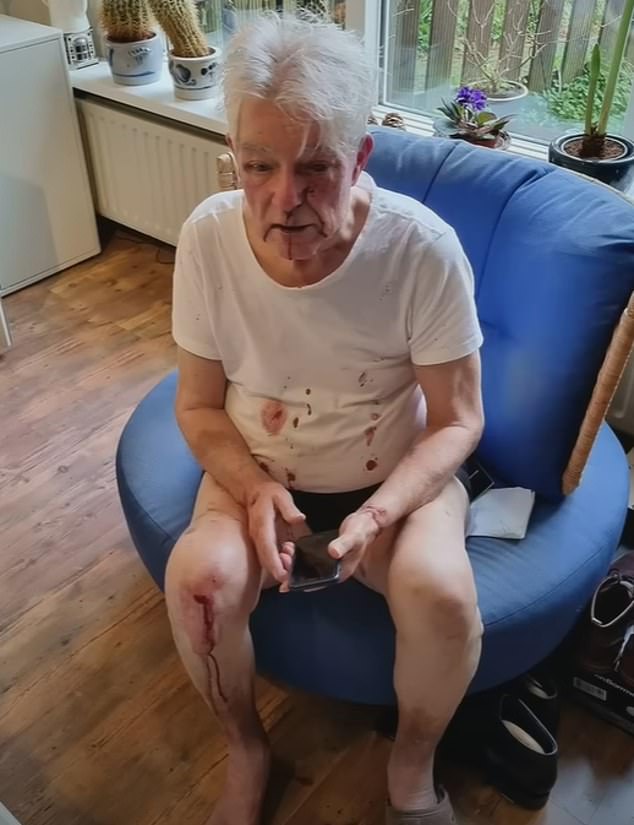
Shocking footage of the aftermath of the attack showed the elderly Dutch man sitting bloodied and confused as he waited for police.
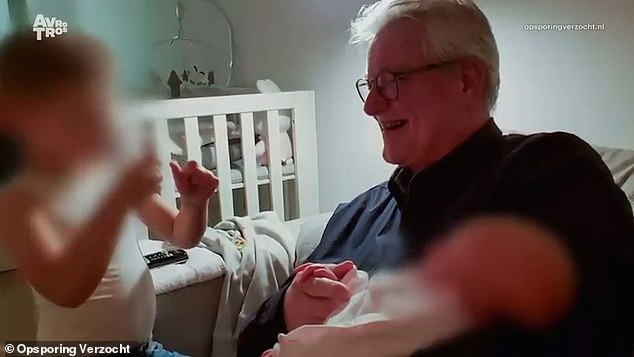
Three months after the regrettable attack, Mr Beulenkamp (pictured with his grandchildren) chose to die through euthanasia, after receiving permission from the Dutch authorities to end his life.
The intruder, a Dutch-speaking man between 20 and 30 years old with a dark skin color according to the description of the victims, rang the doorbell at the Beulenkamp home on November 26 at around 8:30 am.
Mrs. Beulenkamp opened the door and expected to find a neighbor. However, when she was approached by the robber, he immediately threatened her with a firearm and demanded money.
When she didn’t comply, he forced his way in and ransacked every room before heading home.I walked upstairs and saw that Mr. Beulenkamp was still asleep.
The attacker repeatedly hit the pensioner with the butt of his pistol, seriously injuring him. He then attacked Mrs. Beulenkamp and fled with stolen jewelry.
Mr Beulenkamp was treated in hospital for serious injuries to his legs, head and face following the attack.
Initially, he showed positive signs of recovery, with hospital staff surprised by his ability to communicate and walk just days after the horrific attack.
But his condition deteriorated rapidly and in the weeks that followed the pensioner suffered speech problems, coordination problems and partial paralysis.
His son and daughter shared their grief over their father’s rapid decline on the Dutch television program Crime Watch – in English ‘Investigation Requested’ – that sheds light on crimes throughout the Netherlands.
“He started to get worse and then he realized maybe it wasn’t right,” his son said. “His speech and coordination were affected, but he was also paralyzed on one side.”
His daughter added: “It was heartbreaking to see him unable to express himself and make things clear. Our joy in life has been destroyed.”
In January 2024, Mr Beulenkamp chose to undergo euthanasia, a decision supported by his family.
People who die by euthanasia are usually given a barbiturate solution by doctors that stops their hearts. However, it has not been made public how Mr Beulenkamp met his end.
The Netherlands has one of the most progressive euthanasia laws in the world. In the past two months alone, there have been two high-profile cases.
Euthanasia is permitted under Dutch law if the treatment is carried out by a doctor under strict conditions and if the patient’s suffering is hopeless and unbearable.
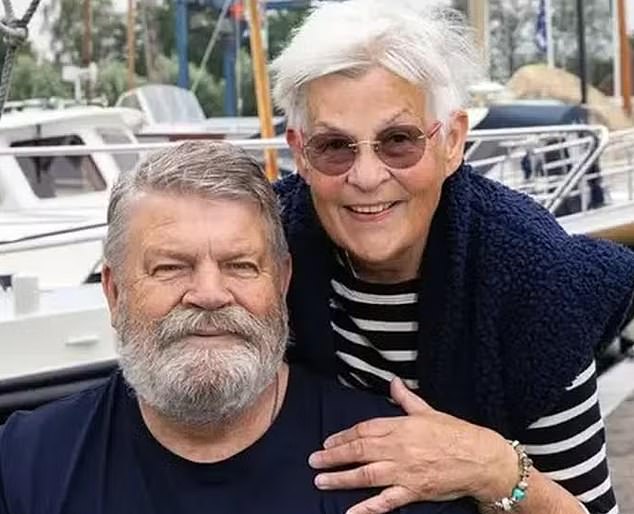
Jan Faber and Els van Leeningen were married for almost five decades before they ended their lives simultaneously in early June. The couple is pictured just days before their deaths

Zoraya ter Beek (pictured), who suffered from depression and borderline personality disorder, decided she wanted to die after struggling with mental health issues for more than a decade because treatment had not helped her
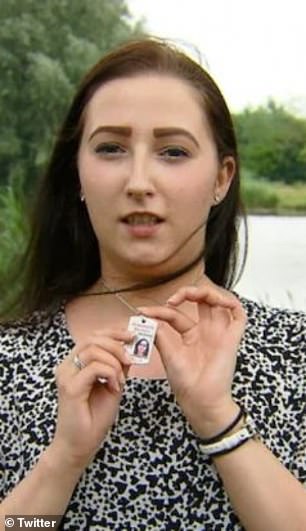
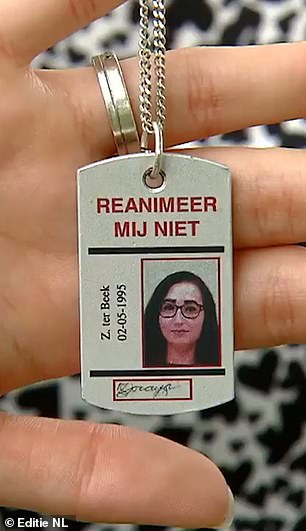
Beek is pictured here in 2017 wearing her ‘do not resuscitate’ badge, something typically worn by older people with a terminal illness.
In early June, a devoted couple who had spent their entire lives together since they met as small children decided to die together through euthanasia.
Jan Faber and Els van Leeningen, aged 70 and 71, were married for almost fifty years before they ended their lives at the same time by lethal injection.
Jan, who worked as a freight skipper, had been suffering from severe back pain for over 20 years. His wife was diagnosed with dementia in 2022. This form of dementia was so severe that she had difficulty forming sentences.
In the moments before their deaths, the couple were surrounded by friends and family, including their son, who found his parents’ decision to end their lives difficult.
“You don’t want your parents to die, so there were tears,” Jan said of his son’s reaction.
“Our son said, ‘Better times, better weather are coming’ – but not for me.” Els said before her planned death:
“There is no other solution.”
In May, a healthy Dutch woman died by euthanasia, shortly after turning 29. She no longer wanted to live with depression and anxiety.
Zoraya ter Beek, who also suffered from trauma and borderline personality disorder, decided she wanted to die after struggling with mental health issues for over a decade, claiming that no treatment had helped her.
She died “a dignified death, which she had longed for for years due to unbearable mental suffering,” according to an obituary published by the Dutch newspaper General Daily Newspaper.
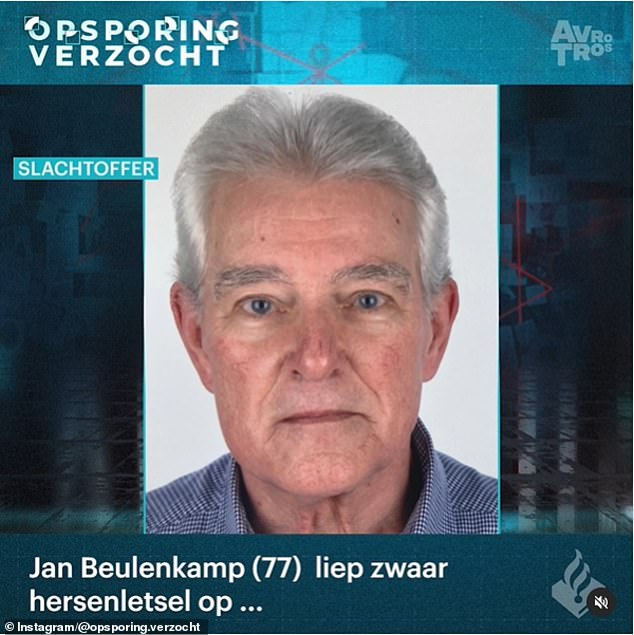
Mr Beulenkamp’s son and daughter shared their grief over their father’s rapid decline on the Dutch television programme Opsporing Verzocht – in English ‘Investigation Requested’ – which sheds light on crimes throughout the Netherlands
Beek’s case received worldwide attention and led to a debate about euthanasia.
Many proponents of euthanasia believe that it should only be available to terminally ill people who face a painful and undignified death.
Others, like Beek, believe that people suffering from insurmountable mental pain should be able to commit suicide in comfort and peace.
Following the death of Mr Beulenkamp in January, police have intensified their efforts to solve the case.
A reward of €10,000 has been offered for any information leading to the arrest of the perpetrator.
“We do not rule out that the perpetrator is from the neighbourhood or knows the neighbourhood well. This is because there is no escape route for a car and the street is a dead end,” said a police spokesperson.
A text message was sent to possible witnesses who were in the area at the time of the robbery in an attempt to generate new leads.
